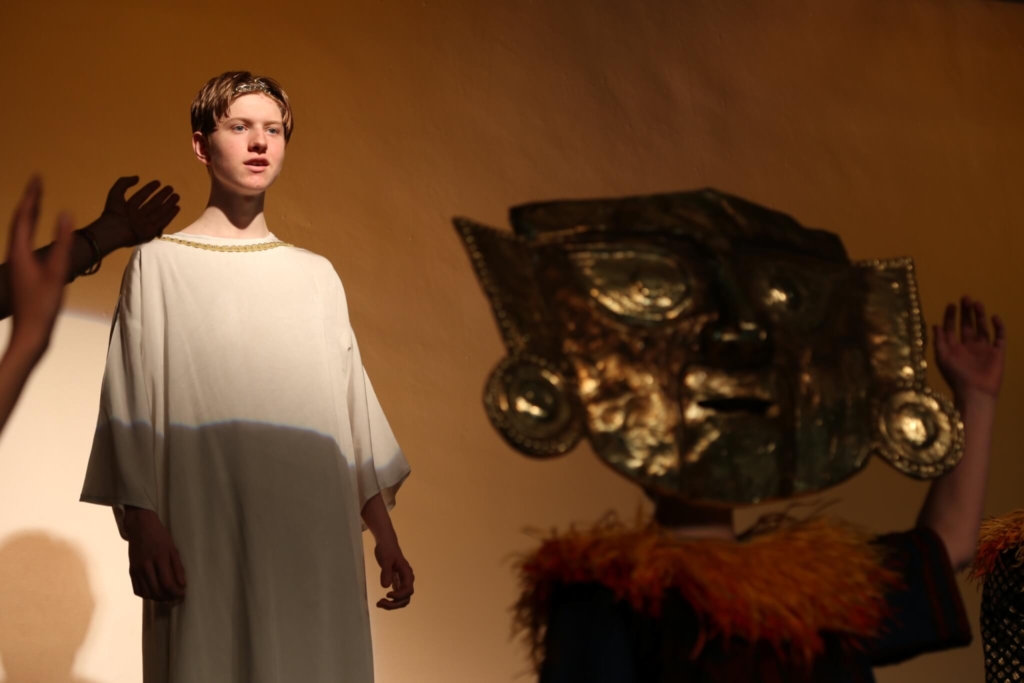Latin
Latin explores the world of Ancient Rome without losing any of the nuance of language through translation.
In a world ranging from the great speeches of Cicero made in the law courts to the love poetry of Catullus. The study of Latin offers an insight into the basis of Western civilisation and language and one of the world’s greatest civilisations.
Year 7 and Year 8 | core subject
In the first two years, students will gain an understanding of the basics of Latin language and sentence translation using the Cambridge Latin Course. Through their study of this textbook, pupils will also be introduced to aspects of daily life in Ancient Rome as well as the Roman belief system regarding the gods and their thoughts on the afterlife. Additionally, students will study some of the great legends and myths of Ancient Rome and Greece as well as the stories of the gods themselves.
Year 9 | option subject
By their third year of studying Latin, students will now begin to work on the Latin GCSE course using the OCR accredited textbook, Latin to GCSE 1. Students will build on their knowledge of Latin grammar and syntax beginning to translate more complex sentences including English to Latin sentences. Pupils will now focus their study of Roman culture and mythology on Virgil’s Aeneid and Homer’s Iliad in translation in order to prepare them for their study of Literature at GCSE as well as giving them a deeper understanding of the Classical World. Additionally, students will be introduced to aspects of Ancient Greek to give them a taster of this for GCSE.
Year 10 and 11, GCSE | option subject
GCSE Latin serves to extend pupils’ learning from Latin to GCSE 1 onto the 2nd book in the course. Pupils consolidate and build on their skills and knowledge to be able to read, comprehend and translate sophisticated Classical Latin texts. Roman history and civilisation form a fascinating background, revealing many of the foundations of Western culture. Later in the course, pupils will read well-known Latin writers in the original language for the first time, accessing ancient minds and important ideas. This qualification will see pupils achieve a high level of competence in the Latin language, while developing a sensitive and analytical approach to language generally, with specific reference to English.
GCSE REQUIREMENTS
– Pupils must have studied at least two years of Latin, or combined Greek and Latin, since Year 8.
EXAMINATION BOARD
– OCR GCSE J282 Latin
Sixth Form, A-Level | option subject
The study of Latin at A-Level affords successful classicists the opportunity to go further and deeper with the language, its literature and cultural world. Students will explore timeless masterpieces in the written word and discover greater nuance in grammar and expression. With regard to literature in particular, emphasis will be placed on the appreciation of Latin texts within their literary, social and historical context. Candidates will develop a thorough understanding of literary technique and a variety of written genres, while enhancing their ability to translate and comprehend Latin of a truly sophisticated and challenging nature.
A-LEVEL REQUIREMENTS
– Grade 7 at (I)GCSE Latin
EXAMINATION BOARD
– OCR A Level H443 Latin
John Lyon Success
– Asher Weisz (OL2019) left John Lyon to read Classics at Balliol College, University of Oxford.
Outside the Classroom
John Lyon’s extensive list of extra-curricular activities includes many options for pupils who enjoy foreign language and history, including Book and Film Club, History Excellence Society and Philosophy Club.
Beyond School
Classicists are renowned for their intellectual curiosity and rigour; Latin is therefore prized as an A-Level qualification by a wide range of employers in such diverse areas as law, medicine, stockbroking, accountancy and journalism. More specifically, Latin affords excellent preparation toward the study of Classics at university level, with obvious applications for research, teaching, archaeology and museum work. Repeated surveys indicate that Latinists are looked upon with considerable favour by employers; it is recognised that the study of Classics implies the capacity for hard and careful work, a heightened sensitivity to the use of language and the ability both to comprehend and manipulate complex ideas. Ultimately, pupils will enjoy the kudos of studying a prestigious subject that sets candidates apart from the crowd.
























































